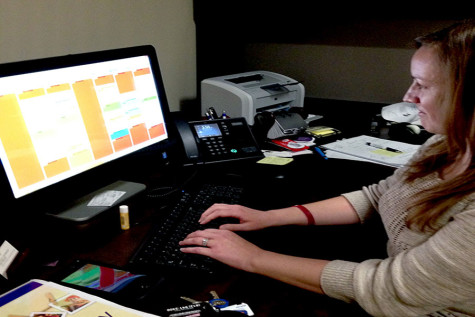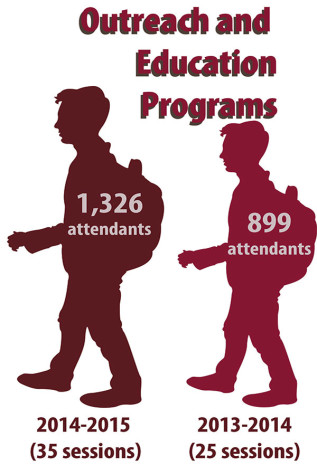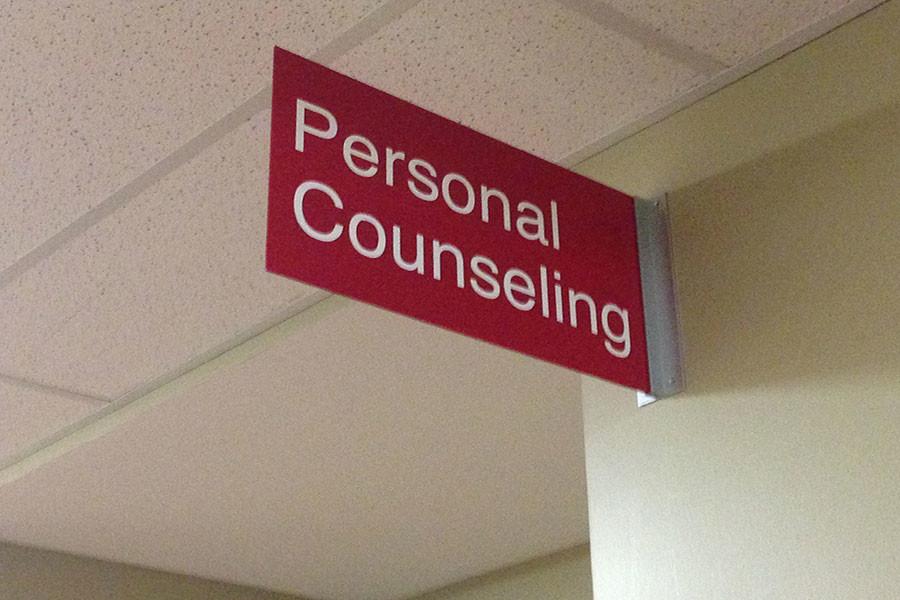Personal Counseling Services is located in University Center South, room 243. Students interested in making an appointment can call 812-941-2244, e-mail Michael Day, director of Personal Counseling Services, at micaday@ius.edu or e-mail the department at sepersco@ius.edu.
Mental health concerns on campus
November 16, 2015
A 22-year-old senior lived with her parents, and she was on track to graduate. However, her parents told her she had to find somewhere else to live. In addition to figuring out where to live, the student had to determine how she would pay her bills, how she would eat and how she would finish school.
When the student lived with her parents, they expected her to wash dishes and complete other tasks for them each night. But the student had a problem: She had to study and complete homework for an average of four hours every night, so she did not have time for housework.
Karen Richie, counselor and care manager in Personal Counseling Services at IU Southeast, said this was a fictional scenario, but some students she’s helped have been in similar situations. Richie said several situations can put emotional stress on top of academic stress. As a result, mental health concerns, such as anxiety, sadness, depression and others can develop.
Michael Day, director of Personal Counseling Services, said the number of IUS students with mental health concerns has been increasing over the last couple of years, creating an increased demand for services. According to the department’s 2014-15 year-end report, the department served 255 students during the 2014-15 academic year, up from 243 students during the 2013-14 academic year.
Day said he believes Personal Counseling Services may be seeing more students with mental health concerns because some students’ lives have been becoming more complicated and stressful, due to various academic and personal situations in their lives. He also said anxiety and stress are the main mental health concerns the counselors see in students.
As a result of the increased demand, the department has responded by providing new services such as outreach and education programs that expand its capabilities, Day said.
“If we can get the information out to people about how to be healthy, as opposed to waiting until they get to where they have a problem, that’s probably a better extension of our effort,” he said.
Day said promoting the outreach and education programs has also helped Personal Counseling Services serve a larger number of students, and they have helped some students feel more comfortable going to counseling.
According to the department’s 2014-15 year-end report, 1,326 people attended the 2014-15 sessions, compared to 899 people in 2013-14. Additionally, 35 outreach and education sessions occurred that year, compared to 25 in the 2013-14 academic year.
Day said Beth Rueschhoff, assistant professor of biology, contacted him and Meghan Kahn, assistant professor of psychology, in 2014 and suggested that IU Southeast should hold a series of talks about mental health and invite the campus community.
This became the Mental Health and Wellness Series, which consisted of events related to mental health awareness, suicide prevention, safe zone training, post-traumatic stress disorder and other topics. Earlier in 2015, Day, Rueschhoff and Kahn won the Campus Commitment Award for Innovation from Campus Life as a result of this series.
Rueschhoff said she had seen several people, including IUS students, who have struggled with mental health issues, but she believed they were fearful of talking about those issues in public. As a result, she decided to suggest the idea to Day and Kahn.
“I decided I was tired of the situation,” Rueschhoff said. “With so many people who struggle with mental illness, it was time to open up a dialogue.”
Kahn said when Rueschhoff contacted her about the idea, she believed it could enable students studying areas besides psychology, and the rest of the IUS community to discuss mental health concerns and learn about mental illness.
“Mental illness is not specific to students of specific majors, so it is important that students, faculty and staff from all areas of campus understand mental illness,” Kahn said. “I felt this series would help students, faculty and staff see that obtaining treatment for a mental illness is not shameful, but is actually beneficial. I also felt that it was important for students to understand that a person does not choose to have a mental illness and that those who suffer from mental illnesses are not weak, in order for students, faculty, and staff to be compassionate to the situations that other people experience.”
Richie said it’s important for students and others to learn to distinguish between mental health concerns and mental illnesses, and the Mental Health and Wellness series can help them learn the differences.
“If we don’t spend time taking good care of our mental health, then sometimes it can fall into this unhealthy version of it,” Richie said. “So at any given time, any one of us can be affected by a mental health concern. And if somebody has a mental health concern and come see Personal Counseling, they’re not automatically given a diagnosis of a mental illness. Because a lot of times there are adjustments to transitions.”
Day said while the Mental Health and Wellness Series focuses on mental illness and other issues, they help students and members of the campus community learn how to keep themselves mentally healthy by taking suggested actions, including breathing deeply, exercising, getting enough sleep, talking to others and finding balance in their lives.
“Just like we do with exercising and eating right, there are things we can do for mental health as well,” Day said.

Besides Personal Counseling Services, sponsors of the Mental Health and Wellness Series include the Pre-Med Society, Psi Chi, the Biology Club, the Psychology Club, the School of Natural Sciences and the School of Social Sciences.
Day said these organizations and schools help get the word out among their members and students, helping each Mental Health and Wellness Series event draw between 30 and 65 people.
Sarah Mann, psychology sophomore, learned that her Psychology 102 professor was offering extra credit to students attending Mental Health 101, the first Mental Health and Wellness Series event. The event was held on Tuesday, Sept. 1.
Mann said she received more than just extra credit, because she learned about the importance of being aware of others’ mental health statuses and the importance of talking to others about mental health without making them uncomfortable.
“Someone can put on a front but there could always be signs,” Mann said. “Just because someone looks like they’re happy doesn’t mean they are.”
Mann said she recommends that students attend Mental Health and Wellness Series events to learn about various mental health problems.
“A lot of people are blind to what’s around them,” she said. “Especially if they’re not a psychology major.”
While expanding services, Personal Counseling Services has expanded its staff. In January, the department hired Richie, who performs counseling and specializes in helping students access local resources to meet food, clothing, shelter, transportation, medical and mental health needs. Richie also manages the emergency food pantry, which provides breakfast items, lunch and dinner items, and quick snacks that students, faculty and staff in temporary need of food can eat.
Richie, along with Day, provides students with access to resources related to mental health in New Albany and surrounding areas, including Lifespring, The Center for Women and Families, Our Place and private counselors.
Richie said informing students about resources is important because the difficulties those students face can impact academic aspects and other aspects of their lives.
Besides Day and Ritchie, there are five graduate students, from University of Louisville and Spalding University, working to provide counseling services to IUS students.
 Louisa Peyronnin, psychology graduate student at Spalding University, serves as an individual counselor in Personal Counseling Services.
Louisa Peyronnin, psychology graduate student at Spalding University, serves as an individual counselor in Personal Counseling Services.
Peyronnin said she mainly provides individual counseling, and working as a personal counselor enables her to practice counseling techniques she has learned in the classroom, including examining students’ thoughts and beliefs from other perspectives and creating a safe environment for those students.
“We’ll always just listen to what they’re saying and try to validate their experiences that they’re going through, things that are tough for them or whatever they’ve come to therapy for,” Peyronnin said. “Because a lot of times, people just don’t have someone they can talk to who can be an impartial person.”
The services Personal Counseling Services provides are confidential, adhering to the American Psychological Association guidelines, Indiana laws, the Family Educational Rights and Privacy Act (FERPA) and the Health Insurance Portability and Accountability Act (HIPPA).
“We’re not going to tell your teachers, we’re not going to tell your parents, we’re not going to tell anybody what you talked about,” Day said. “It would be against the law. We’re all licensed and we’re not going to violate our license. So hopefully that helps people to feel comfortable and confident.”
Day said Personal Counseling Services wants to increase its services even more. He said the department wants to find more ways to help students in short-term financial need, and it wants to start more outreach education programs.
In the meantime, Day said Personal Counseling Services will continue to provide its long-running, free services, including individual counseling, family counseling, couples’ counseling, referrals to local resources and crisis intervention.
Day said each student who visits a counselor in Personal Counseling Services receives one-on-one attention and is in control of topics that are discussed. He also said most students who visit Personal Counseling Services come for three to five 50 minutes sessions, but students can have more or less sessions if needed.
According to the 2014-15 IU Southeast Personal Counseling Services client satisfaction survey, 91 percent of students who had appointments with counselors in the department found the counseling services helpful, and 90 percent of students who completed five or more sessions ended up having less symptoms of mental health issues or other issues than when they decided to go to counseling.
Peyronnin said Personal Counseling Services can change several aspects of students’ lives.
“I hope people who are thinking about coming to Personal Counseling will make the decision to try to come, because it has the potential to be a really helpful avenue for them for change,” she said.
Personal Counseling Services is located in University Center South, room 243
Open 9 a.m. to 5 p.m. Monday through Friday
If interested in making an appointment:
Call 812-941-2244, e-mail Day at micaday@ius.edu or e-mail Personal Counseling Services at sepersco@ius.edu.
Mental Health and Wellness Series
The next Mental Health and Wellness Series event is Substance Use and Risk for HIV, HepC. Local experts will explain how to manage and avoid substance abuse-related risks, and they will describe how HIV and hepatitis C can impact physical and mental health. The event is being held on Nov. 17 in University Center North, room 127 from 5 to 7 p.m.
In addition to the Mental Health and Wellness Series, Personal Counseling Services holds other outreach and education sessions. For example, the department holds suicide prevention training sessions called QPR (Question Persuade Refer).
Also, the department began holding Out of the Darkness Walks on campus this year to raise awareness for suicide prevention. The first walk was held on Thursday, April 9, and another walk was held on Saturday, Sept. 26.
